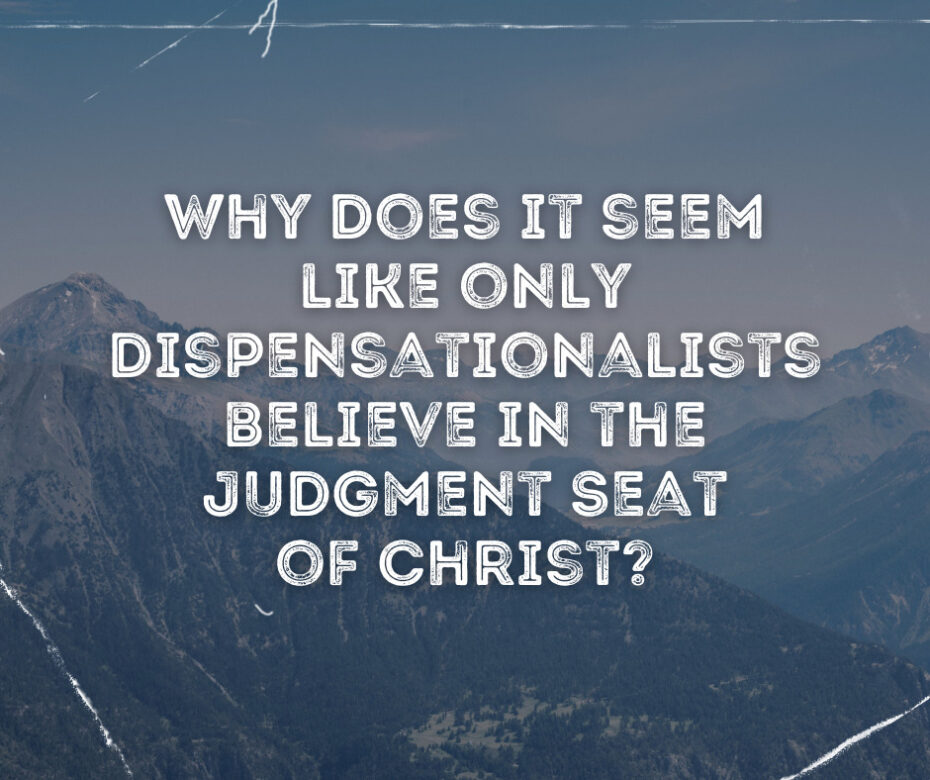Jack emailed me a great question: “Why does it seem like only dispensationalists believe in the Judgment Seat of Christ?”
For those who are not theology nerds, a dispensationalist believes that at various times–or dispensations–in the world’s history, God has changed His commandments.
For example, today God allows us to eat pork or shrimp. We can work on Saturday.
But between 1440 BC and AD 33, those things were forbidden.
Nor do we offer animal sacrifices or worship in the temple during this age.
Dispensationalism has a lot to say about eschatology, the study of the last days, as well. One aspect of eschatology is future eschatological judgment.
Most traditions of Christianity (i.e., non-dispensationalists) say that there is only one future eschatological judgment. That is normally called final judgment. Most in Christendom believe that no one will know his final destiny until he undergoes the final judgment.i
Dispensationalists, however, believe that believers will be judged at a separate future judgment called the Judgment Seat of Christ, or Bema. The purpose of the Bema will be to determine eternal rewards, not eternal destiny. The only people being judged at the Bema will be people with everlasting life.
Most non-dispensationalists believe that the Judgment Seat of Christ is another name for the Great White Throne Judgment. So it is misleading to say that only dispensationalists believe in the Judgment Seat of Christ. Everyone in Christianity believes in the Bema. But Jack’s point is that most in Christianity do not understand it as a rewards judgment for believers only. He is right about that.
Dispensationalists believe that believers will have no final judgment (John 5:24). Church-age believers will not be judged at the Great White Throne Judgment (GWTJ, Rev 20:11-15). Unbelievers from the church age will be judged there. But not believers.
The purpose of the GWTJ will be twofold: to announce the eternal condemnation of all not found in the Book of Life (Rev 20:15) and to determine the degree of eternal torment they earned based on what is found in the books of deeds (Rev 20:12-13). Both believers and unbelievers will reap what they sowed in this life (Gal 6:7).
Back to Jack’s question. Why is it that only dispensationalists believe that the Judgment Seat of Christ is a separate judgment for believers?
First, Jack is exaggerating the situation slightly. Some non-dispensationalists do believe in a separate judgment, called the Bema, for believers. However, it is probably fair to say that over 95% of non-dispensationalists believe that there will be only one eschatological judgment and that the Bema is another name for the GWTJ.
Second, tradition is powerful. If you grew up in a tradition that did not believe in the Bema as a separate judgment, you likely wouldn’t believe in it either. If you grew up in one tradition and then changed to another as a young adult, you’d still probably be in a tradition that sees but one eschatological judgment.
Third, if you are in a dispensational church, you might never hear the expression the Judgment Seat of Christ. You might never hear any teaching about eternal rewards. Sadly, many dispensationalists do not teach about the Bema and eternal rewards. I’ve met many people who spent decades in dispensational Bible churches, but who told me—after hearing a message by me on the Bema—that they had never heard anything about the Bema and eternal rewards.
Most people have never heard a sermon about the Bema.
Most commentaries, podcasts, and videos understand passages that deal with eternal rewards as dealing with eternal destiny.
It is hard to understand the Bema correctly without being mentored by someone. It can and has happened. But it is rare.
Your best shot at learning about the Bema is to listen to a dispensational teacher or read a dispensational book.
But that is not your only shot. God is a rewarder of those who diligently seek Him (Heb 11:6).
I once asked Zane Hodges in a class on Hebrews at DTS why he thought the Bema and eternal rewards was so prevalent in that book. He said that the Judgment Seat of Christ and the doctrine of eternal rewards are found on nearly every page of the New Testament.
I’m convinced that is true. Are you?
__________
i I don’t know how they can maintain that. Wouldn’t those who find themselves in heaven after their death know for sure that they were eternally secure? And wouldn’t the opposite be true? If someone died and realized he was in Hades, wouldn’t he be sure that he would be eternally condemned?


